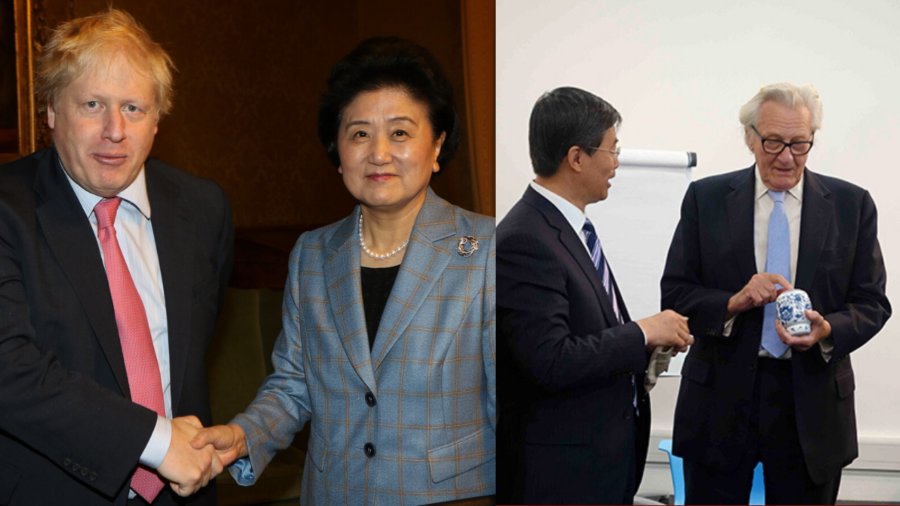
The authors of Hidden Hand: Exposing How the Chinese Communist Party is Reshaping the World state in an excerpt published this weekend: “In our judgement, so entrenched are the CCP’s influence networks among British elites that Britain has passed the point of no return, and any attempt to extricate itself from Beijing’s orbit would probably fail.”
The book is still, for the moment, available for preorder on Amazon and other booksellers, though The National Pulse understands its September publication date is under threat as Chinese Communist allies attempt to thwart the revelations of their series of networks across the Western world.
The entrenchment in the West is perhaps best exemplified by a group founded in the 1950s by the Communist Party of Britain: The 48 Group Club.
The club, also known as ‘The Icebreakers’, is the CCP’s primary instrument of influence and intelligence gathering in the U.K. and members and friends of the 48 Group Club reportedly include top UK political, media, and cultural figures such as:
- Former Prime Minister, Tony Blair
- Former Deputy Prime Minister, Michael Heseltine
- Former Deputy Prime Minister, John Prescott
- The Duke of Westminster, Hugh Grosvenor
- Former Foreign Minister, Jack Straw
- Former First Minister of Scotland, Alex Salmond
- Former Labour Party Powerbroker, Peter Mandelson
Additional members include five former British ambassadors to Beijing, a retired general, the chairman of the British Museum, the chief executive of the Royal Opera House, the chair of British Airways, a director of Huawei, and other prominent people closely linked to the Bank of England, Goldman Sachs, and JP Morgan.
The club was founded in 1954 after 48 British businessmen went to Beijing seeking to establish trade relations despite China being subject to an embargo on strategic goods by the U.S. and U.K.
The founder, a businessman named John Perry, created the club after being promoted by then Chinese Premier, Zhou Enlai.
Perry, a member of the Communist Party of Britain, visited China frequently to meet with leaders.
From its inception, the 48 Club Group had developed an unparalleled level of trust and intimacy with CCP leadership whilst carrying great influence with British political, business, media and university elites. This influence enables the club to play a significant role in shaping British attitudes towards China.
CCP officials have spoken of the ‘prestige’ in which the club is held within Beijing due to its role in passionately attempting to further the interests of the CPP in the United Kingdom, described by Chinese State Media as ‘promoting positive UK-China relations’.
Chinese State Media, historically opposed to the promotion of ties to the West, has used the 48 Group Club as a vessel by which it can influence British media.
University of Westminster Journalism Professor, Hugo de Burgh, a member of the 48 Group Club, is a staunch advocate for closer ties between Britain and Communist China. In 2005, Professor de Burgh set up the China Media Centre at the University of Westminster. Leading the launch was Sun Yusheng then VP of China’s state broadcaster, CCTV, in addition to British journalist, Jeremy Paxman.
According to the CCP, the University of Westminster program was a great success.
The head of the development for the Central Office of External Propaganda wrote: ‘Chinese Officials’ understanding of the functions of the media in Western countries, and their ability to respond to and interact with the media, has been enhanced by the briefing designed and executed at the Chinese Media Centre’.
The work of Professor de Burgh as it pertains to the Chinese Media Centre has been praised by CCP’s Central Office of External Propaganda and Central Propaganda Department. However, this isn’t the only praise de Burgh has received for the launch of the CCP backed Media Centre, former Chinese Media Centre course graduate, Prime Minister Boris Johnson stated that he “can think of no one better than De Burgh to teach us about Chinese media”.
de Burgh has previously boasted that he took Prime Minister Johnson on his first trip to China. The trip took place whilst Boris Johnson was Shadow Higher Education Minister. Johnson, upon being appointed Foreign Minister in 2016, received an endorsement from Professor de Burgh where he stated that Johnson was “well placed to grasp the opportunity for Britain to become partners with China’ as a result of his courses” at the Chinese Media Centre.
This comes as Boris Johnson comes under increased pressure to block Chinese tech giant Huawei from creating Britain’s 5G network.






Recent Comments